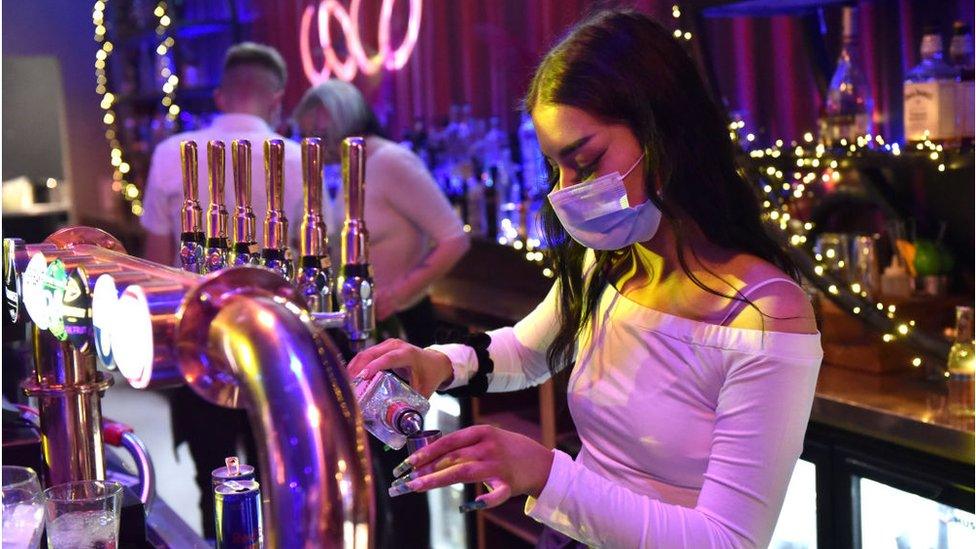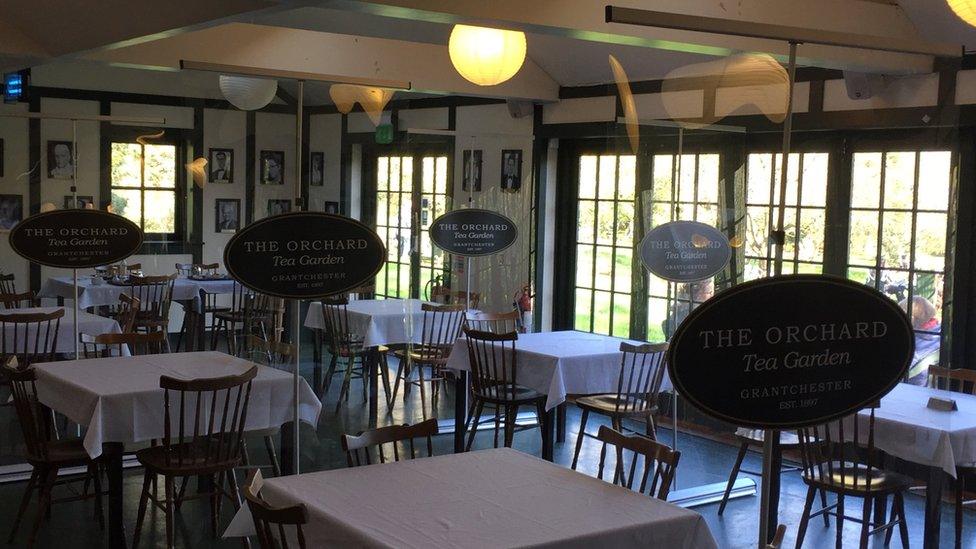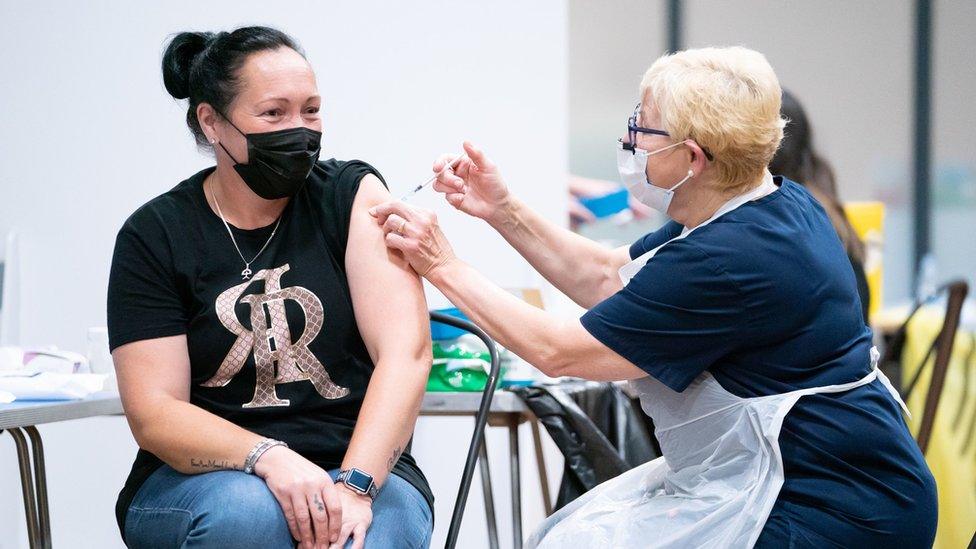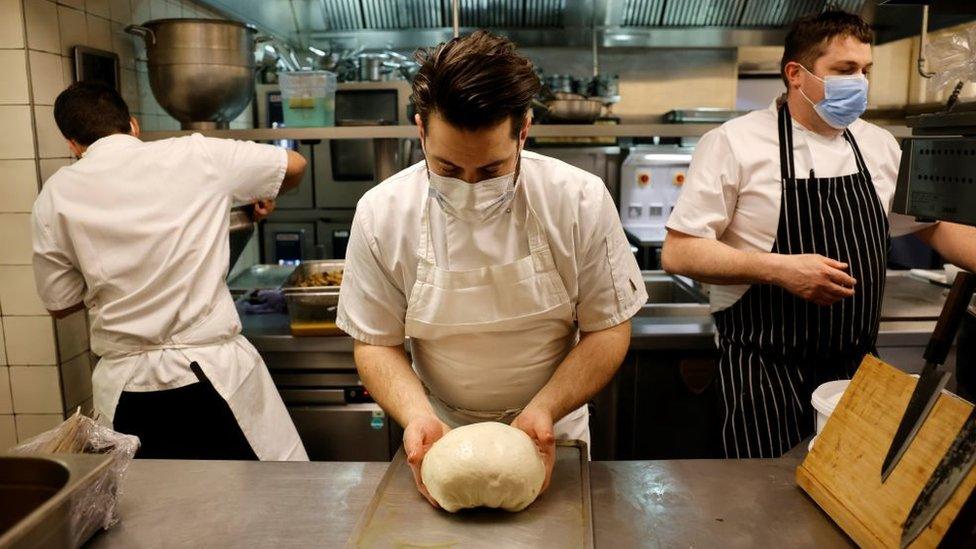Warnings of staff shortages due to self-isolation
- Published

A decision not to ease rules on self-isolation until 16 August could lead to severe staff shortages this summer, industry groups have warned.
From next month, double-jabbed people in England will not have to isolate if a close contact tests positive.
But with cases rising and most Covid rules set to end on 19 July, there are fears millions of people will still have to take time off work this summer.
UK Hospitality said self-isolation was already causing "carnage" to firms.
At the moment, close contacts of people who test positive for Covid have to isolate for up to 10 days.
But UK Hospitality boss Kate Nicholls said testing could replace isolation for people who've been in contact with a Covid patient.
"We understand the need for caution and effective transmission control," she wrote on Twitter, external.
"What we are asking for is pragmatic adjustment to avoid disadvantaging young workers - test to release as per international travel will reduce disruption without reducing protection."

The Orchard Tea Garden was forced to close as staff self-isolated
The Orchard Tea Gardens in Grantchester near Cambridge had to close this week after several staff were contacted by the NHS Test and Trace app.
Owner Charles Bunker said sales were already down 30% this summer, while ingredient prices and staff wages had risen sharply. The cafe now faced a "perfect storm" due to the impact of test and trace.
"The reality is that most of these people aren't ill, they've just been in contact with someone who has and have had to self isolate," he told BBC Radio 5 Live's Wake up to Money.
"We need a system now whereby people can test, and immediately they are found not to have Covid they can come back to work.
"16 August will be two thirds of the way through our summer and the hospitality is dependent on having a good summer."

What are your rights if asked to self isolate?
Currently, if you are required to self isolate your employer cannot force you to come into work, says Emma Bartlett, an employment lawyer at CM Murray.
Doing so would not only breach your rights but those of your fellow workers in terms of health and safety.
As you isolate you may be entitled to Statutory Sick Pay, which is worth £96.35 a week, or more if your employer has a sick pay scheme.
A £500 grant is also available in England to people on low incomes who have to self-isolate. This includes parents who can't work because their child has to self-isolate.

'Balance'
On Tuesday, Health Secretary Sajid Javid said he expected cases to "rise significantly" as restrictions were eased and that they could go as high as 100,00 per day.
According to BBC analysis, more than 4.5 million people could still be asked to self-isolate between now and 16 August.
But Business Secretary Kwasi Kwarteng insisted the government had to strike a balance between reopening the economy and curbing the spread of Covid-19.
"On the one hand we're being told that the restrictions are too onerous, and on the other we're being told that we're being too loose in terms of lifting those restrictions. And that's the balance, that's the nature of political judgment," he told Sky News.

Staff at The Wall climbing centre in Cumbria
Cumbrian climbing centre The Wall only has three staff and if they all had to isolate at the same time the business would have to shut, manager Joe Holden said.
All staff are under 25 and none have had the jab, he added.
"It's hard enough to get enough people through the door, let alone keeping up with the rules changing every few weeks," he told the BBC.
"We'll have to take on more staff as a contingency option [in case we're forced to isolate] but training more people increases the workload and costs for us."
Another sector potentially at risk from a rise in self-isolation is beauty. Most businesses in the sector are small and only employ a few staff. They also rely heavily on younger workers.

The staff of KH Hair Group in Leicester and Oadby
Lesley Blair, boss of industry group Babtac, said self-isolation was "incredibly disruptive" and urged the government to give staff in the industry priority for second vaccinations ahead of 16 August.
"Alternatively ideally rules could be changed, subject to certain conditions, such as daily tests being done, to allow businesses to stay open and staff to work provided they tested negative each day."
However, Amanda Falls, owner of KH Hair Group in the East Midlands, said she "welcomed" the easing of self-isolation rules from August.
Out of 26 staff across her two salons, 20 have been double jabbed and those that have not are under 20 years old. One fully vaccinated staff member had to self-isolate recently costing her about £2,000 in lost income.
"Businesses can't continue like this - if I got tracked and traced I'd be fuming because I'm double jabbed," she said.


Do you run a business? Have you seen staff shortages due to Covid cases and self-isolation? Share your experiences by emailing haveyoursay@bbc.co.uk, external.
Please include a contact number if you are willing to speak to a BBC journalist. You can also get in touch in the following ways:
WhatsApp: +44 7756 165803
Tweet: @BBC_HaveYourSay, external
Please read our terms & conditions and privacy policy
If you are reading this page and can't see the form you will need to visit the mobile version of the BBC website to submit your question or comment or you can email us at HaveYourSay@bbc.co.uk, external. Please include your name, age and location with any submission.
- Published6 July 2021

- Published2 July 2021
